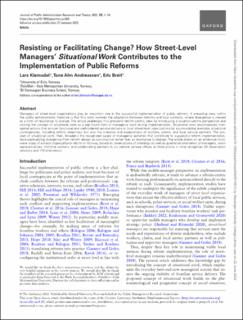Resisting or facilitating change? How street-level managers’ situational work contributes to the implementation of public reforms
Peer reviewed, Journal article
Published version

View/
Date
2022Metadata
Show full item recordCollections
- Scientific articles [2181]
Original version
Journal of Public Administration Research and Theory, 2022, 1-14, Online First 27 January 2022 10.1093/jopart/muac004Abstract
Managers of street-level organizations play an important role in the successful implementation of public reforms. A prevailing view within the public administration literature is that this work involves the adaptation between reforms and local contexts, where divergence is viewed as a form of resistance to change. The paper challenges this prevalent reform-centric view by introducing a situation-centric perspective and coining the concept of situational work as a significant form of managerial work during implementation. Situational work encompasses managerial actions that ensure functional and well-ordered service delivery in local street-level organizations by accomodating everyday situational contingencies, including reform objectives, but also the interests and expectations of workers, clients, and local service partners. The concept of situational work, then, broadens the recognized scope of managerial activities that contribute to successful reform implementation, reconceptualizing divergence from reform design as constructive rather than as resistance to change. The paper draws on an extensive multi-wave study of a major organizational reform in Norway, based on observations of meetings as well as qualitative interviews of managers, union representatives, frontline workers and collaborating partners in six welfare service offices at three points in time (altogether 23 observation sessions and 173 interviews). Resisting or facilitating change? How street-level managers’ situational work contributes to the implementation of public reforms
